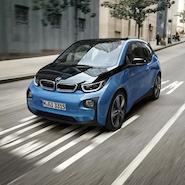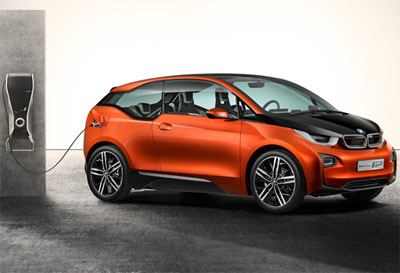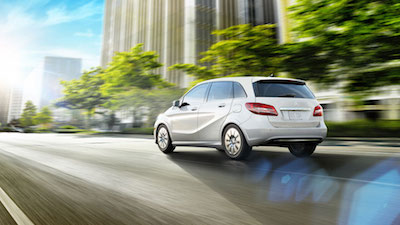German automaker BMW is fighting allegations of defects in its electric i3 vehicles.
On May 17, MLG Automotive Law filed a national class action lawsuit against BMW North America, LLC alleging that the i3’s “Range Extender” feature is defective. Automakers are clamoring to garner a sizable share of the growing electric vehicle market, so the setbacks of the lawsuit could be substantial if these allegations are verified.
“These cars are flat out dangerous,” said Jonathan Michaels, founding member of MLG Automotive Law. “It is only a matter of time before someone is going to get seriously hurt or killed because of this.
“We need to do all we can to prevent that from happening,” he said. “Class actions are not quick, but we intend to vigorously litigate this for the quickest resolution possible.”
BMW did not respond to request for comment.
Defective vehicles?
The case, “Edo Tsoar v. BMW North America, LLC” takes issue with the performance of the BMW i3’s Range Extender, or “REx,” feature. REx outfits the i3 with a two-cylinder gasoline engine capable of producing 34 horsepower, which turns on when the battery charge is down to its final 5 percent.
BMW claims that in REx mode the i3 has an extra 70 miles in it, nearly doubling its 81-mile electric range. Such a feature gives drivers time to locate to finish a journey or find a charging station during longer road-trips, or have mobility if no charging stations are nearby.
However, according to the lawsuit, a drastic decrease in the vehicle’s performance accompanies the gasoline engine. It alleges that a car full with passengers or moving up a hill experiences difficulties with the low charge in REx mode, even dropping speeds down to 45 mph on the freeway without warning.
“The BMW i3 Range Extender feature is a dangerous instrumentality to the owners of the vehicles and to other motorists on the road,” Mr. Michael said. “Having a sudden and unexpected loss of power in a motor vehicle can result in a catastrophic situation for all those on the road. These cars are dangerous and should not be driven.”
In addition to compensating the owners, who were allegedly misled and endangered, the lawsuit aims to have i3 vehicles redesigned and repaired at BMWs expense and to halt i3 sales until the matter is resolved.
The i3 is not BMW’s only electric vehicle – the brand has a plug-in hybrid i8 – but the more accessible price point makes it the vehicle of choice for aspirational consumers, who tend to be younger and have a pronounced concern for the environment. The safety concerns the lawsuit raises will likely have a negative impact on sales and drive these consumers to the electric models of other automotive brands.
Numerous luxury automakers have or will soon make available electric models as a way of capturing the growing market. Losing out on this market even in the short-term could have longer-term consequences for BMW as prospective clients develop loyalty toward its competitors.
In particular, the similarly priced Mercedes B-Class, retailing at $41,450 to the i3’s $42,400, could emerge as a viable alternative. The Audi A3 e-tron could also benefit from consumers willing to sacrifice range.
Eager for electrics
This is not the first time that a luxury automaker has been hit with a performance-related lawsuit.
In September, Audi said that 2.1 million of its diesel-powered cars were outfitted with the software its parent company Volkwagen used to cheat emissions tests (see story).
Then, on Nov. 2, United States regulators said 10,000 Porsche vehicles contained software that allowed the Volkswagen-owned automaker to give false reading during emissions testing. With 10,000 vehicles added to the approximately 500,000 U.S. automobiles cited by the Environmental Protection Agency and California regulators, the increase will continue to hurt Volkswagen’s credibility (see story).
Interest in entering the electric vehicle market is clearly on the rise.
German automaker Porsche is generating early buzz for its first electric vehicle, despite the model not having a launch date.
The microsite allows users to watch the design unfold through a series of virtual slides, examine the vehicle from different vantage points and learn about the design, performance and features just by scrolling. The vehicle, the Mission-E, was announced at the Frankfurt Motor Show and does not yet have a launch date, but teasing it with an elaborate and well-designed microsite will create strong initial buzz (see story).
“I believe this underscores how young the electric vehicle market is,” Mr. Michaels said. “Manufacturers, like BMW, are putting cars out before they are ready for consumer use, with disastrous effects. I do not believe this will fair well for BMW.”
from
http://redirect.viglink.com?u=http%3A%2F%2Fredirect.viglink.com%2F%3Fu%3Dhttps%253A%252F%252Fwww.luxurydaily.com%252Flawsuit-alleges-safety-and-performance-issues-in-bmw-i3-models%252F%26amp%3Bkey%3Dddaed8f51db7bb1330a6f6de768a69b8&key=ddaed8f51db7bb1330a6f6de768a69b8




No comments:
Post a Comment